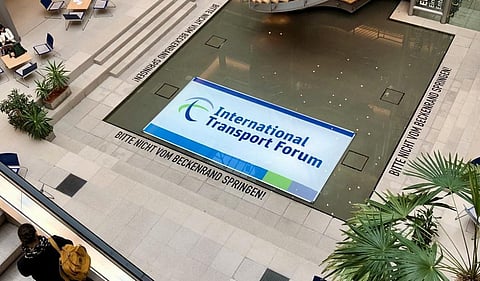

Acting now and decarbonising transportation can reduce the need for investment in core infrastructure — roads, railways and ports — than continuing in a business-as-usual scenario.
Decarbonisation, in turn, can help in achieving the goals of the 2015 Paris Agreement, a report released at a major transport conference on May 24, 2023, said.
A mix of policies is needed to promote sustainable choices in different contexts, ITF Transport Outlook 2023 report of the International Transport Forum at the Organisation for Economic Co-operation and Development (OECD), said.
“In a transport decarbonisation context, this means investing in public transport infrastructure and policies that support the move to transport modes with higher occupancy or load factors, and more compact cities,” the report added.
Such an approach could potentially save governments from spending $4 trillion globally on road maintenance and investment, the document presented at the event in Leipzig, Germany, noted.
“If action to decarbonise transport is ratcheted up and accelerated, the transport sector can still reduce its CO2 emissions by about 80% over the next 25 years (compared to 2019). This drop would put transport on the right path for limiting the global temperature increase to “well below” 2 degrees Celsius above pre-industrial levels, the goal of the Paris Climate Agreement,” the report elaborated.
“Reaching this high-ambition scenario requires a combination of complementary policies that successfully avoid unnecessary transport activity, shift more trips from fuel-burning to no-carbon transport and improve the efficiency of transport generally,” said ITF Secretary-General Young Tae Kim while presenting the report.
“It will be absolutely essential to quickly scale up cost-competitive technologies and fuels to move people and goods with far, far fewer emissions. We can do all this if we take more decisive action now,” added Kim.
According to ITF projections, to provide the core infrastructure for the high ambition scenario in the report would require about 5 per cent less investment than under current policies.
“In the case of transport, comparing investment needs under the Current Ambition scenario with the High Ambition scenario reveals that a strong push for decarbonising transport is in fact not more expensive: the total capital investment needs of core infrastructure for road, rail, airports and ports are 5% lower with ambitious policies in place than carrying on with business as usual,” the report noted.
Transport ministers from across 64 member countries of the ITF gathered for the three-day summit at Leipzig.
Under the event theme of ‘Transport Enabling Sustainable Economies’, ministers are expected to discuss themes ranging from climate change to Ukraine and supply chain resilience to active mobility.
Over 1300 delegates from around 80 countries are likely to participate in total. The United Kingdom holds the Presidency.
ITF—a think tank for transport policy organises the Annual Summit of transport ministers. It is administratively integrated with the OECD yet politically autonomous.